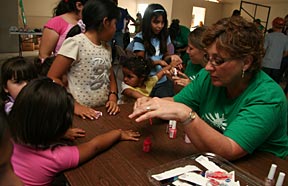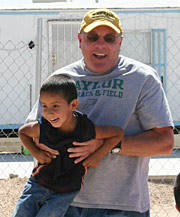KidsHeart volunteers say God worked miracles with Kool-Aid and crafts
Posted: 6/27/07
| Team members from First Baptist in Memphis conducted Vacation Bible School at Sparks Colonia as part of KidsHeart El Paso. (Photos by Jenny Pope/Buckner) |
KidsHeart volunteers say God worked
miracles with Kool-Aid and crafts
By Whitney Farr
Communications Intern
EL PASO—As Hubert Jones and his missions team entered the impoverished Sparks Colonia on the outskirts of El Paso, he questioned whether the church group could make an impact.
But as he mentally began to list all his inadequacies, a group of small children behind him started to sing, “My God is so big, so strong and so mighty, there’s nothing my God cannot do.”
 |
| The kids in colonias near Fort Hancock were all smiles as they recieved their new shoes, donated by Buckner International's Shoes for Orphan Souls, and ate hotdogs with the volunteers. |
Jones stopped listing why he wasn’t good enough.
For Jones, it wasn’t about the weaknesses of the missions team from First Baptist Church in Memphis, a small town in the Texas Panhandle. It was about the strength of the God they served, he said.
“We are so limited, but God is unlimited. He took our Kool-Aid, candy and craft projects and worked miracles,” Jones said.
Volunteers served up to 40 children daily at Mision Bautista Tierra Prometida, a one-room church in the Sparks Colonia, through Vacation Bible School, sports camps, block parties and shoe donations.
First Baptist in Memphis joined First Baptist Church of Levelland, and Second Baptist Church in Lubbock as part of the first-ever KidsHeart mission week in El Paso, sponsored by Buckner and the Cooperative Baptist Fellowship.
In just two weeks, workers from First Baptist of Levelland and Second Baptist of Lubbock constructed a 2,850-square-foot church in Fort Hancock, east of El Paso. The church will seat 225 people and serve as the central location for Buckner to continue operating community ministry.
“One year ago, I prayed for a building,” Pastor Ramiro Campos said. “And I thank God for answering my prayer.”
 |
| Two youth from First Baptist in Levelland add final touches to the fresh paint job on the newly constructed church, Iglesia Bautista Immanuel. |
Campos explained that Fort Hancock in general—and his church in particular—had suffered many broken promises from mission teams in the past. So, when this 34-member team arrived and delivered what they had promised, it was extremely meaningful.
“To me, these people are angels,” Campos said. “Working so hard for people they don’t even know exhibits the love of God to everyone that passes by this new church. They are marvelous people who don’t look down on us, but instead, serve us.”
From painting little girl’s fingernails at the neighborhood block party to painting walls, the volunteers enjoyed every minute, even if they were munching on dirt and sand that the dry wind constantly blew their way.
Ty Talley, a high school student from Levelland, said the most meaningful part of the trip had been “talking with the Christian men when a few of us were on the roof. I learned a lot just listening to the older men from Second Baptist” in Lubbock.
Talley, who helped build houses in the Rio Grande Valley last summer through KidsHeart, said he expected great things from the trip and considered this week of hard work the high point of his summer vacation.
 |
| Volunteers from First Baptist Church in Levelland and Second Baptist Church in Lubbock provided the younger girls with a little pampering during a block party at KidsHeart El Paso. |
“I will never forget the look on their faces last summer, when the family saw the house we built for them,” Talley said. “I came this year because I wanted to see that same reaction on the little kids’ faces.”
Talley’s wish came true as—one by one—children received brand-new shoes. He helped distribute the shoes, part of Buckner International’s Shoes for Orphan Souls Shoe Drive, under the roof of the new church that he and so many others had worked on during the week.
“These teens have been so valuable—working on the roof, painting, hammering. They have been tremendous workers,” LaVerne Love, a volunteer from Second Baptist in Lubbock said while hammering.
Jeff Scott, youth pastor at First Baptist in Levelland, said he regularly emphasizes the importance of missions to his teenagers.
“There are so many trips that go into Mexico and other parts of the world, while people right here in our state are being ignored,” he said. “We want our kids to realize that you don’t always have to leave your country to find people in need.”
Dusty streets lined with makeshift homes, outhouses, trash, and no running water emphasized his point. But their greatest need?
 |
| Hubert Jones of First Baptist in Memphis scoops up a small boy during a game of duck-duck-goose in the Sparks Colonia. |
“Food,” said Tommy Speed, director of Buckner Children and Family Services in West Texas. “And ultimately, a purpose.”
He said the question constantly arises, “Are these people illegal immigrants?”
“I don’t ask, and I don’t care,” Speed said. “If we see a family in need, we help them.”
People have approached him, afraid of the legality of helping people who may not be citizens, but “churches don’t have to be afraid of helping people,” he said. “You don’t have to harbor immigrants, just help them.”
The example of selflessness these Christians provided even encouraged community members to serve.
“The block parties and construction of the church ended up being a community effort,” KidsHeart volunteer Ken Noles said.
A woman who lived next door to the church allowed the crew to tap into her electricity, and a man came from the county to provide free use of a land grader to the church builders from Levelland.
And, after seeing more than 650 people line up to receive a meal and new shoes at the Sparks block party, the mission team turned to a neighbor when they realized their one small grill would not suffice. She offered her own personal grill.
“I can’t describe the feeling of going over the hill and seeing a field of humanity in a place where all I had seen was a small group of women gathering for an aerobics class,” Noles said. “First thing I thought—We need more hot dogs!”
Brian Hill, a volunteer from Levelland who had built houses in the Valley during previous KidsHeart mission trips, kept reminding the team and himself that even though they were not seeing the immediate effects on a family, like they had seen when building homes, this was only the beginning of ministry.
And he was right. God already used the church to change hearts and lives. More than 20 professions of faith were made by new believers.
“I can’t express the joy in my heart,” Campos said.
News of religion, faith, missions, Bible study and Christian ministry among Baptist churches, in Texas, the BGCT, the nation and around the world.